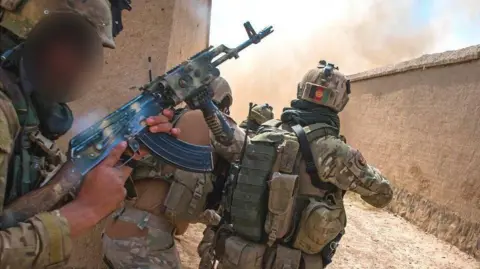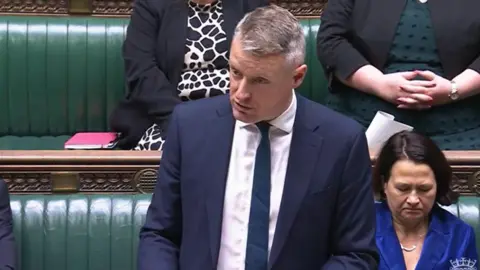Jonathan Beale
Defence correspondent

The government says it is allowing some “eligible” Afghan special forces soldiers who fought alongside the British military to resettle in the UK, after they were previously rejected.
Under the previous government, about 2,000 Afghans who served with specialist units – known at the “Triples” – were denied permission to relocate to the UK after the Taliban takeover in 2021.
Armed forces minister Luke Pollard told the House of Commons a review had now found some applications were wrongly turned down.
Pollard said there was no evidence of “malicious intent” in the initial decision-making process, instead blaming poor record-keeping for any errors.
The so-called “Triples” were elite units of Afghan soldiers set up, funded and run by the UK.
On Monday, Pollard said the government has so far overturned 25% of the rejections.
He said a review had found new evidence that some of the Afghan soldiers had been directly paid by the UK government, meaning they were eligible for resettlement – and this evidence had been “overlooked” during the initial resettlement applications.
These errors were caused by a “failure to access and share the right digital records, and challenges with information flows across departmental lines”, he said.
He criticised the previous government for a “critical failure” in locating the correct paperwork.
The defence minister said the government had reviewed many of the cases as a matter of urgency because many of the Afghan troops “remain at risk” under Taliban rule.
Some of the Triples are reported to have been targeted and killed by the Taliban.

The review into the rejected applications was announced by the previous Conservative government in February, after former armed forces minister James Heappey said the decision-making process behind some rejections had not been “robust”.
Pollard said the review’s findings did not mean that all Triples would be eligible for relocation, adding officials were still re-assessing some of the applications.
Shadow veterans minister Andrew Bowie welcomed the continuation of the review.
He said the Conservatives wanted the correct decisions made on the “very important and highly sensitive applications as speedily and fairly as possible”.
 Afghanistan Peace Campaign
Afghanistan Peace Campaign